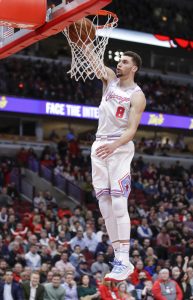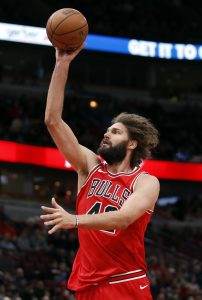When the Bulls sent Jimmy Butler to Minnesota in a draft-night trade last June, it was a signal that the team intended to embark on an all-out rebuild. Veterans like Rajon Rondo and Dwyane Wade were also jettisoned and Chicago entered the 2017/18 season as Las Vegas’ odds-on favorite to finish dead-last in the NBA.
Improbably though, veterans such as Nikola Mirotic and Bobby Portis – who were involved in a practice altercation that resulted in facial fractures for Mirotic and a lengthy suspension for Portis – and youngsters like Lauri Markkanen and Kris Dunn helped lead the Bulls to a solid first half. The club eventually fell out of playoff contention and bottomed out as expected, but its 27-55 record was only tied for the NBA’s sixth-worst mark.
That first-half success was a double-edged sword for the Bulls — while it ultimately prevented the franchise from landing a top-five pick, Mirotic’s impressive play helped the club acquire another first-round selection, and the promising performances from guys like Markkanen and Dunn bode well for the future. The Bulls will enter the 2018 offseason looking to keep adding to that core.
Here are five key questions facing the franchise this summer:
1. What will Zach LaVine‘s new contract look like?
LaVine was perhaps the most important piece of the Bulls’ return for Butler at the time of the trade, despite being in the midst of an ACL recovery. Dunn had just endured an uninspiring rookie season and Markkanen wasn’t considered a slam-dunk prospect. LaVine, on the other hand, was coming off an age-21 season in which he posted 18.9 PPG on .459/.387/.836 shooting. While the Bulls didn’t sign him to a rookie scale extension last fall, they expressed confidence about getting something done with the young shooting guard in restricted free agency.
Now, with LaVine’s free agency right around the corner, that approach looks like it was the right one. LaVine, who struggled in 24 games in 2017/18, hasn’t exactly boosted his stock during his time in Chicago, and cap room around the NBA will be scarce this summer. At one point, it seemed like LaVine might require a $100MM investment, but that’s far from a sure thing now.
Something in the range of Gary Harris‘ extension with the Nuggets (four years, $74MM) seems more reasonable for LaVine, and it’s possible the Bulls can get an even greater discount if they don’t face stiff competition on the RFA market. It would only take one team high on LaVine to mess with the Bulls’ plans – as we saw last summer with the Knicks and Tim Hardaway Jr. – but if that team doesn’t surface this offseason, Chicago has a chance to lock up a core player at a more team-friendly rate than anticipated.
2. What will the Bulls do with the No. 7 pick?
With Dunn, LaVine, and Markkanen viewed as the cornerstones in Chicago, small forward and center represent the club’s most glaring long-term holes. The Bulls shouldn’t draft for positional need with a pick as high as No. 7, but as it so happens, there are a handful of intriguing small forwards and centers who figure to be on the board at that spot.
In his latest mock draft, ESPN’s Jonathan Givony has the Bulls nabbing Duke center Wendell Carter Jr., noting that Carter is the sort of promising young big man who would complement Markkanen in the frontcourt. Although he’s only 19 years old, Carter is a polished player whose basketball IQ and versatile skill set make him an attractive prospect, Givony notes.
If the Bulls opt for a small forward, Michael Porter Jr. and Mikal Bridges figure to be the top options available, with Miles Bridges potentially in the mix as well. Porter is more of a combo forward who may need to work on his shooting in order to be a reliable option at the three, but his upside is tantalizing as long as the medicals on his back check out. Mikal Bridges is a more traditional three-and-D small forward who would be a safer pick than Porter, but probably wouldn’t have the same sort of star potential.
Read more
3. What will the Bulls do with their cap space?
Even with a cap hold for LaVine on their books, the Bulls head into the 2018 offseason with the opportunity to create up to $27MM or so in cap room. That easily exceeds what most clubs around the NBA will have available, and creates an interesting opportunity for the franchise.
The Bulls aren’t just one big move away from contention, so saving that cap room until at least 2019 makes more sense for the rebuilding club. But that financial flexibility could come in handy in the short term. For instance, the Bulls could take a Nets-like approach, making a play for a young restricted free agent who could become a long-term building block — if their offer sheet is matched, they could use their cap space to acquire unwanted contracts and pick up extra picks in the process.
If the Bulls prefer not to risk eating into their 2019 cap room, a Lakers-esque approach could make more sense. A year ago, the Lakers traded for and signed players whose contracts would expire after one year, adding veterans like Kentavious Caldwell-Pope and Brook Lopez. Having those players in the fold – along with various forms of Bird rights – will create some extra opportunities for the Lakers this coming offseason if they fall short in pursuit of their top targets.
4. Is Robin Lopez on the trade block?
The Bulls’ highest-paid player, Lopez is one veteran who will enter 2018/19 on an expiring contract. A valuable defender in the middle, Lopez would appeal to contending teams and doesn’t seem to fit the Bulls’ rebuilding timeline, so it would make sense for the club to see what it could get in a trade for the veteran center.
However, the Bulls have talked about Lopez as if he’s a key piece, with executive VP of basketball operations John Paxson referring to the big man as “an important part of our future” at season’s end. I don’t believe the Bulls would make a player like Lopez untouchable, but it sounds like they’re not eager to shop him in trade talks this summer either.
If Lopez sticks around through the offseason and remains on the Bulls’ roster as a veteran leader, the team could reconsider trade options at next winter’s deadline, or even keep him all season and then see if he fits into the club’s future plans as a free agent a year from now.
5. Will the Bulls extend Bobby Portis?
After Portis broke bones in Mirotic’s face with a punch during an October practice, there was speculation that his days in Chicago were numbered — that certainly appeared to be the preference in Mirotic’s camp. However, the Bulls’ front office didn’t see it that way, going out of its way to let Portis off the hook by suggesting to the media that Mirotic was partially responsible for instigating the altercation.
Since the incident happened behind closed doors, it’s impossible to say whether the Bulls’ portrayal was 100% accurate, but the story serves as evidence of the club’s fondness for Portis, who enjoyed a career year once he returned from his suspension (13.2 PPG, 6.8 RPG). Does the club like him enough to sign him to an extension after he becomes eligible for one on July 1? That’s less certain.
Markkanen is the Bulls’ power forward of the future, so there’s probably no urgency to get a potential backup locked up right away. The team may also be a little gun-shy after committing $32MM over four years to Cristiano Felicio last summer. And holding off on a Portis extension might allow the Bulls to better maximize their cap room in 2019, since Portis’ cap hold as a restricted free agent would be just $7.5MM. An extension in 2018 is a possibility, but I don’t think it’s likely.
Here’s where things currently stand for the Bulls financially:
Guaranteed Salary
- Robin Lopez ($14,357,750)
- Omer Asik ($11,286,516)
- Cristiano Felicio ($8,470,980)
- Lauri Markkanen ($4,536,120)
- Justin Holiday ($4,384,616)
- Kris Dunn ($4,221,000)
- Cameron Payne ($3,263,294)
- Jerian Grant ($2,639,314)
- Bobby Portis ($2,494,346)
- Denzel Valentine ($2,280,600)
- Total: $57,934,536
Player Options
Team Options
Non-Guaranteed Salary
Restricted Free Agents
- Noah Vonleh ($4,333,931 qualifying offer / $10,515,698 cap hold): Bird rights
- Zach LaVine ($4,333,931 qualifying offer / $9,606,654 cap hold): Bird rights
- David Nwaba ($1,699,698 qualifying offer / $1,699,698 cap hold): Early Bird rights
- Total: $21,822,050
Unrestricted Free Agents / Other Cap Holds
- No. 7 overall pick ($4,403,246)
- No. 22 overall pick ($1,974,488)
- Total: $6,377,734
Projected Salary Cap: $101,000,000
Projected Cap Room: $27,081,076
- Our cap projection for the Bulls includes the amount of their 10 guaranteed contracts, cap holds for their two first-round picks, and LaVine’s cap hold, since the Bulls are viewed as a near-lock to bring him back. That result in a total team salary of $73,918,924.
Footnotes:
- Zipser’s salary becomes fully guaranteed after July 18.
Note: Rookie scale cap holds are estimates based on salary cap projections and could increase or decrease depending on where the cap lands.
Salary information from Basketball Insiders was used in the creation of this post. Photos courtesy of USA Today Sports Images.

